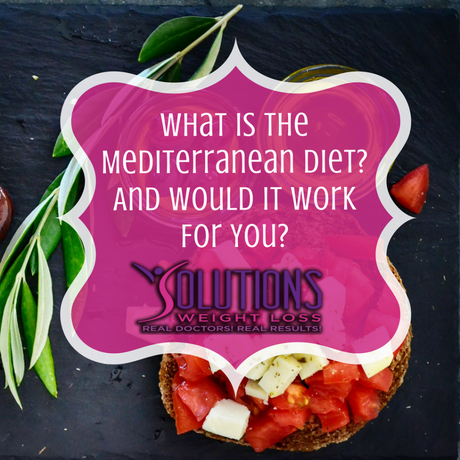
Written by Orlando Weight Loss on . Posted in Diet Tips, Healthy Food Options, Ketogenic Diets, Popular Diets, Weight Loss Tips
Diet trends come and go faster than we can start them, but that does not hinder our curiosity. Consistently, they are chalked up to eliminating food groups or a restrictive food intake, setting us up for a mid-diet burnout or dangerous eating habits. Although some plans may achieve the desired results, they are often short-lived and lack practical healthy lifestyle choices. If you are ready to give yet another diet a go, we are happy to present our Mediterranean diet 101.
Consisting of well-balanced and relatively non-restrictive foods, the tried-and-true Mediterranean diet sets you up for a healthier, extended future. It focuses on the type of fats you eat, rather than how much. Online nutrition program, Real Living Nutrition Services , breaks down the difference between the three main fats found in our food. Along the way, you will learn about what food contains and how it has an impact on your overall health. As one of the few diets that will leave you both happy and healthy, it may be the right plan for you.
What is the Mediterranean Diet?
The Mediterranean diet encapsulates the traditional cooking style of countries bordering the Mediterranean Sea in the 1960s. But why should you try the Mediterranean diet over other plans? To start, it was not developed in a lab, but evolved over 5,000 years based on a natural way of living. While the diet consists of a few basic rules, the meals created can be adapted to any local and seasonal food availability.

Equally important, it is not just a weight loss plan, but promotes healthy living. The Mayo Clinic calls the diet "heart-healthy" , as it is associated with lower levels of 'bad' cholesterol, thereby reducing your chance of heart disease. It is also said to reduce the chance of diabetes, cancer, Parkinson's and Alzheimer's. For these reasons, most major scientific organizations encourage healthy adults to adapt a similar diet. Notably, the base of the Mediterranean diet food pyramid consists of physical activity and interactive mealtimes. The Mediterranean lifestyle considers this aspect important, as it encourages healthy socialization.
Mediterranean Diet Meals
So what areas of your diet will change? Like the and Ketogenic Diet , it begins with a set calorie goal. A typical Mediterranean diet will range between 1,200 to 1,500 calories daily. This list will inform you about what you should and should not consume, as well as the recommended daily servings.
Meat and seafood - The 'bad' cholesterol previously mentioned is due to saturated fats ‒ which are the highest in red meat. The Mediterranean diet replaces meat with plant-based foods, although red meat can be enjoyed a few times a month. Eggs and poultry are better than red meat, but only in moderation. Instead, fresh fish or seafood is recommended up to twice a week, cooked in olive or canola oil.
Fruits and vegetables - As the base of every meal, an average of nine servings of antioxidant-rich fruits and vegetables should be consumed every day. At least one meal a day should include a salad or other leafy greens, so get your kale on! Other fruits and vegetable servings can include olives, figs, cherries, dates, tomatoes, grapes and melons, among others.
Grains - Unlike most diets, and a relief to many, bread is a staple in every Mediterranean meal. The only stipulation is that they are whole-grain. These contain tons of vitamins, minerals and healthy fats. Other grains and pasta are also regularly featured, from five to six servings a day. Whether it is dipped, smeared, or twirled on a fork, enjoy your carbs!
Nuts and seeds - A popular snack, raw nuts or seeds contain high doses of healthy fats, fiber and protein. You can have three to five one-ounce servings of raw nuts a week. The most popular are almonds, hazelnuts, pine nuts, pistachios, walnuts and sesame seeds. A fresh pesto or tahini is perfect for dipping whole-grain bread!
Dairy products - Approved dairy products are few and should be consumed in moderation. Try to stick to unprocessed and low-fat cheese and yogurt. For example, Greek yogurt, feta and Parmigiano-Reggiano . Other dairy products are eliminated, or can be replaced with olive oil, which is much more flavorful and rich in monounsaturated fats, omegas and antioxidants. Seven to 14 tablespoons is recommended weekly.
Seasonings - One large hurdle for many to overcome is the use of salt. Often consumed with pastas and grains, large amounts of salt can increase your blood pressure, putting you at risk for heart attack, stroke, dementia and kidney disease. Instead, the Mediterranean diet utilizes fresh herbs and spices, which have a variety of health benefits.
Beverages - If you have a hard time coping with a lack of your favorite dairy, take solace in the occasional glass of wine ‒ with your doctor's approval. The Mediterranean diet allows up to five ounces of wine daily. Like any good diet, at least six glasses of water a day is recommended. If you want a little pick-me-up, a small unsweetened coffee or tea is fine.
Sweets - Unfortunately, sweets have no place in a Mediterranean diet, including sweeteners. If you are craving something sweet, a fresh and juicy piece of fruit will keep you full. A large grapefruit, nectarine or apple can go a long way.

Conveniently, most Mediterranean meals require little preparation. For example, our easy Mediterranean omelet . Like all dishes, it contains the freshest ingredients and consists of a range of flavors. Many assume that Mediterranean meals are strictly Greek, but they include foods from many countries, such as Morocco, Spain and Turkey. Don't be afraid to look further! If you have a hard time discovering dishes, Healthline offers a helpful example of a week's worth of Mediterranean meals .
If you are still feeling uninspired, would love to assist you in your diet plan decision. Start your weight loss journey with the care and knowledge of a physician who understands the frustrations and challenges of weight loss. at Solutions Weight Loss , the preferred Orlando weight loss clinic.
Trackback from your site.

